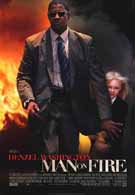Man on Fire is a vicious, uncompromising look at the effects of a kidnapping in Latin America. It is also a heartfelt character study about the relationship between a young girl (Dakota Fanning) and her bodyguard (Denzel Washington). The film represents a new direction for flashy action auteur Tony Scott, whose hard-hitting films (most recently Spy Game and Enemy of the State) are typically soulless.
The film opens with subtitles explaining that a person is kidnapped every sixty seconds in Latin America, and only 70% are likely to survive. We witness an everyday businessman being dragged off of the street from his wife and into a getaway car, held for ransom, and finally returned to his family in the middle of a freeway, nearly naked, and physically damaged (I’ll skip the violent details). This continued wave of kidnappings leads a couple (Marc Anthony, Radha Mitchell) worried about their only child, Pita (Fanning), to enlist the protection of an ex-government operative named Creasy (Washington), who is haunted by his crimes against man and spends his days drinking life away. Reluctantly, he accepts the job.
Every day, he coldly whisks her away to school, uninterested in her or her interest in him. Eventually, he warms to the girl because of her smart but somewhat innocent nature. As their relationship grows stronger, so does his will to live. One day, as she is coming back from piano practice, she is abducted, and Creasy is shot several times by the abductors and left for dead. When he awakens, he begins investigating the kidnapping and unleashing his wrath on those responsible.
Man on Fire does not dish out angry revenge clichés like The Punisher or any of the dozens of vengeance epics. Audiences have become used to the idea of a family man who loses his family and then seeing as he begins to take revenge within the first act. But Man on Fire takes its time and builds a case, allowing the first act to focus on the growing bond between Creasy and Pita. The viewer comes to appreciate why Creasy is so hell-bent on destroying those who took his ward.
The effect is much like the relationship in Matchstick Men between an obsessive-compulsive con-artist played by Nicholas Cage and the fourteen-year old daughter he never knew he had (played by Alison Lohman). That film told the story of a troubled career man whose life becomes worth living thanks to an intelligent young girl. Also no surprise, that film was directed by Tony Scott’s older brother, Ridley, in what many considered to be the cold filmmaker’s warmest, most character-driven venture yet. Here, too, a filmmaker known for cold visuals allows character development to drive forward the action.
Man on Fire is a moral drama about replacing an unacceptable evil with one that is acceptable. Though wanted by the police for his wave of destruction, Creasy fills the void that the girl’s kidnapping creates. Washington, who sank into a brief mediocre muck with John Q and Out of Time, returns to playing a multi-layered character who must not only overcome obstacles, but his own demons. Though he is tormented by the loss of Pita, he still takes pleasure in exacting his vengeance.
But like many of the Scott brothers’ films, Man on Fire is over-directed and chaotic. The visuals shift drastically from needless slow-motion to emphasize key shots (that would have come off perfectly at regular speed) to a hyperactive camera that prohibits the viewer from being allowed to witness the action. Moreover, the story makes the strangest use of subtitling. Not only is dialogue spoken in English subtitled, many of those words are often flashed on the screen, blown up three sizes, and used as devices to emphasize those very words.
Man on Fire is still a rousing, furious action-drama. Most importantly, the hero is a man we want to get behind. His intentions become the hopes of the viewer, and when he gets the job done, we have every reason to cheer. If Creasy, a man whose profession is murder, and Tony Scott, who has never shown heart in his storytelling, can both be redeemed, then the film is as much about the power of redemption as is it is about vengeance.











